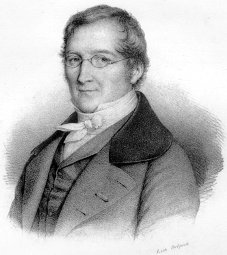A Tale of Three Scientists
Today, three friends and an act of forgiveness change the course of science. The University of Houston's College of Engineering presents this series about the machines that make our civilization run, and the people whose ingenuity created them.
 It's 1804. We're at a salon in the French countryside. The guest is Joseph Gay-Lussac -- a brilliant young chemist, only 26. He's just made a series of heroic balloon ascents. He's been measuring the atmosphere with instruments of his own invention. He's gone as high as 23,000 feet with no breathing apparatus.
It's 1804. We're at a salon in the French countryside. The guest is Joseph Gay-Lussac -- a brilliant young chemist, only 26. He's just made a series of heroic balloon ascents. He's been measuring the atmosphere with instruments of his own invention. He's gone as high as 23,000 feet with no breathing apparatus.
Also in the room is Alexander von Humboldt, 35. Humboldt is a well-known scientific generalist. He's with the German diplomatic mission in Paris. Humboldt has worked in geography, astronomy, and atmospheric studies. Gay-Lussac recently found flaws in Humboldt's atmospheric work. He savaged it in print.
Now the two meet for the first time, and Humboldt does a remarkable thing for those aggressive times. He swallows his hurt. He congratulates Gay-Lussac on his balloon ascents. He offers the hand of friendship. That remarkable gesture isn't lost on Gay-Lussac. And so begins a lifelong cooperation.
After that, Humboldt went on an important geographical expedition to South America. When he came back in 1809 he found lodging with the third and youngest member of this remarkable trio. That was François Arago -- a 23-year-old astronomy professor.
Arago and Gay-Lussac were old friends. It's Arago who reported Humboldt's unexpected act of trust. It's his writings that reveal the values that the three of them shared for 50 years.
Arago, Gay-Lussac, and Humboldt all wrote voluminously. All assumed statesmanlike roles that reshaped European science. They represented a new fusion of Industrial-Revolution technology with the ivory tower of French theory. They brought a new social conscience to science. Arago fought scientific elitism. He also fought the French slave trade.
Humboldt's writings drew the scattered 19th-century sciences together. He too fought for social justice. Not long before the Civil War, he wrote acidly about slavery in America. He said that our talk about freedom seemed to be little more than a means in the pursuit of profit.
And Gay-Lussac became a great teacher. He had a most profound influence on science when a young German named von Liebig came to study with him. Gay-Lussac opened the youth's eyes to a whole new view of science. Back in Germany, Liebig used Gay-Lussac's ideas to create the first modern R and D lab.
So three friends helped to shape the science that rose out of 18th-century revolution. And it all traced to an act of simple courtesy between Humboldt and Gay-Lussac, celebrated by Arago. In 1804, the outbound ripple from a small act of human decency changed science -- and it changed history.
I'm John Lienhard, at the University of Houston, where we're interested in the way inventive minds work.
(Theme music)
Hahn, R., Arago, Dominique François Jean. Dictionary of Scientific Biography. Vol. 1 (C.C. Gilespie, ed.) Chas. Scribner's Sons, 1970-1980.
Biermann, K-R., Humboldt, Friedrich Wilhelm Heinrich Alexander von. Dictionary of Scientific Biography. Vol. ??, (C.C. Gilespie, ed.) Chas. Scribner's Sons, 1970-1980. pp. 549-555.
Arago, D.F., Joseph Louis Gay-Lussac. The Golden Age of Science: Thirty Portraits of the Giants of 19th-Century Science by Their Scientific Contemporaries. (Bessie Zaban Jones, ed.), New York: Simon and Schuster, 1966, pp. 187-216. (The Arago biographies of Volta, Laplace, and Herschel in this same volume do much to explain Arago's important place as a scientific observer.)
Arago, M., Life of James Watt. 2nd ed., Edinburgh: Adam & Charles Black, 1839. (M. must stand for Monsieur. Arago's initials were D.F.J.)